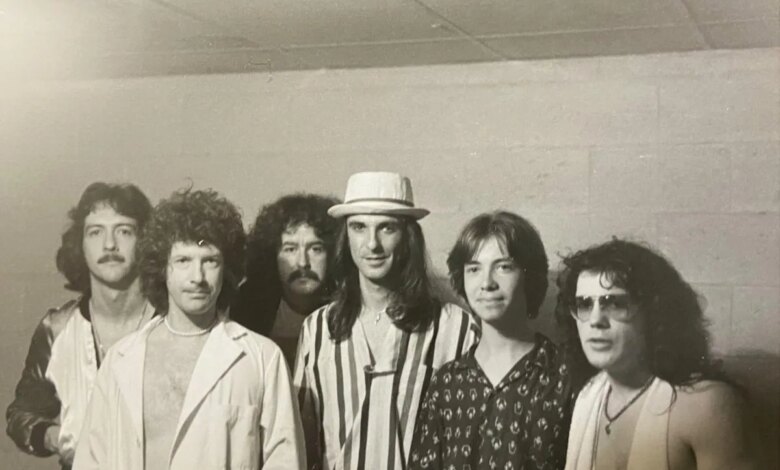Book pays homage to Max Webster, almost Canada’s Next Big Thing

Until recently, Kim Mitchell had forgotten about that day in Indianapolis in 1981 when he performed “Battle Scar” with his Toronto rock band Max Webster and a man in a mask of ex-President Richard Nixon snuck onto the stage to join them.
The song was recorded for Max Webster’s 1980 album ‘Universal Juveniles’ as a duet with Toronto label mates Rush, so it didn’t take long for audiences to recognize the prankster.
“It was Geddy Lee,” Mitchell, 70, recalled, chuckling over the phone. “He only came to do ‘Battle Scar,’ but he didn’t want the audience to know it was him until he started singing. I remember that moment and that Richard Nixon mask as he hurtled through the song’s second verse, but it was one I had completely forgotten about.
Mitchell’s memory of that incident – and a deluge of others – was pinched a few months ago when author Bob Wegner showed the band’s founder his new self-published coffee table book “High Class,” an appreciation and compendium by Max Webster.
From 1972 until they broke up in 1981, the group created five wonderfully idiosyncratic studio albums borrowed from Frank Zappa’s playbook with serious chops, offbeat humor and disciplined musicianship, but imbued with their own signature Max Webster flavor to almost make Canada’s to be next. Big thing. (The band reunited for a one-off performance in 1990, a short tour between 1995 and ’96, and a final show in 2007.)
Each album – 1976’s ‘Max Webster’, 1977’s ‘High Class in Borrowed Shoes’, 1978’s ‘Mutiny Up My Sleeve’, 1979’s ‘A Million Vacations’ and 1980’s ‘Universal Juveniles’ – were sold in Canada alone. and the band sold at least 50,000 copies. secured a deal with Rush’s SRO Management, a recording contract with the trio’s Anthem label, and supported them on tours of North America and the UK
Max Webster’s unique appeal also had a secret weapon in Pye Dubois, one of rock music’s more inventive and rare full-time lyricists. Diamonds Diamonds’, ‘Gravity’, ‘Oh War!’ ‘The Party’, ‘Waterline’, ‘Paradise Skies’ and ‘Battle Scar’.
As you may remember from that mid to late ’70s, early ’80s music era, bands were expected to be productive both in the studio and on the road. Max Webster toured relentlessly—even headlining Maple Leaf Gardens three times within 18 months—released albums annually, but was not the overall label priority because that status belonged to Rush.
Finally, after a performance in Memphis, Mitchell got the burnout and pulled the plug.
“I just got a little tired,” Mitchell said in an interview. “The writing was on the wall. For our management company, record company and publisher, who were all under one house, Rush is their thing and we didn’t get the attention I think the band needed.
“And that’s okay: we were so happy for Rush. But I thought, ‘I’m committing suicide here, so I think I’ll take a year off the road, write and re-evaluate, and maybe join another band.’ I fantasized about joining another band and my phone wouldn’t ring. So I had to start a solo career. That’s how it ended for me.”
Wegner may seem like an unlikely Max Webster fan, given that he says he was “minus one year old” when the band’s Memphis moment happened.
“What got me into them?” he asked rhetorically. “When I was young, I heard Max like everyone else: on the radio, or you went into people’s homes and played their music at parties.”
It wasn’t until he became a dedicated musician himself in his teens – he’s now a professional guitarist and was hand-picked by Queen’s Brian May to play on the Canadian performance of the musical “We Will Rock You” – did Wegner truly appreciate the magic of Max Webster .
“I started to realize, ‘Oh, this is really good music, so interesting and so well arranged.’ Then I started a website about their concert history.”
But Wegner still felt that the group’s legacy was not being adequately served — despite a previous biography of Martin Popoff called “Live Magnetic Air: The Unlikely Saga of the Superlative Max Webster” — and decided to do something about it.
“High Class” is a comprehensive 400-page coffee table book that includes not only Max Webster’s origin story, but also an overview of their professional lives, with many photos submitted by fans who got wind of Wegner’s project and sent him their memorabilia.
“The Martin Popoff book is great, but I just wanted to fill in the gaps,” said Wegner. “I wanted to record the itinerary and the whole travelogue and just move on, have all the color photos and write a pretty comprehensive history. Martin was super supportive of my project.
There are setlists, the breakdown of the band’s numerous lineups – it started in 1972 as a trio with Mitchell, bassist Mike Tilka, and singer/drummer Phil Trudell, and ended with Mitchell, drummer Gary McCracken, keyboardist Terry Watkinson, bassist Mike Gingrich and guitarist Steve McMurray – and even includes unreleased song titles.
Mitchell is quite impressed.
“I spent a few hours looking through the book at home and I’d say 70 percent of the photos I hadn’t seen before were stuff submitted by fans,” said Mitchell.
“It’s very humiliating. I didn’t know that the band was thought of in that regard. I thought we were a band that came and went like a fart in a storm.”
For Wegner, who crowdfunded part of the project and used some of his own savings to make it happen, putting the book together was a labor of love and a huge lesson in teamwork.
“It only takes hundreds of logistical things for a project like this to succeed. It was really amazing how an army of people came to my aid and helped me with things I couldn’t do on my own.”
Wegner also has a Super 8 film of some of Max Webster’s performances and hopes there will be a documentary one day.
“They made a documentary about Anvil. They did one on Teenage Head. There should be a Max Webster documentary,” he said.
Kim Mitchell is clear about one thing: the band’s playing days are over.
“Terry (Watkinson), the keyboardist, has health issues. Gary (McCracken) has retired. And for me, I’ve been a musician who’s been on it all along, while they haven’t. To ramp this up would require months of rehearsal and it’s just too much work to bother. The idea of getting a band to play that material for a night could be fun. But the rest of the guys are no longer active musicians.”
Unfortunately, there has also been no end to the ill will that lyricist Dubois apparently feels for Mitchell, which ended their creative and personal relationship following Mitchell’s 1989 solo album “Rockland.”
“I don’t really know what happened and some people have a grudge about something,” Mitchell said. “I don’t even know what the grudge is. I can’t comment on it…
“I wanted to continue that relationship, but one day you get a letter from a lawyer saying, ‘Mr. Dubois wants no more contact with Mr. Mitchell,” and I said, “Okay.”
“That’s him; that’s his life and I hope he enjoys it.”
Wegner’s book also pleased me: As a high school student in St. Catharines, I gathered with a bunch of friends to sneak minors into the now-defunct Uncle Sam’s in Niagara Falls, Ontario, to see Max Webster three times for an hour set play.
I remember it being a mesmerizing performance and being deeply impressed by Mitchell’s lightning fast licks on guitar, drawing a curious Pye Dubois to our table and chatting with him. Finally, we meet the band backstage after the show at Dubois’ invitation.
What failed me was the exact date – April 17, 1978 – and thanks to Wegner’s careful research I can now identify that as the first time I saw this excellent band, who warmed me up for their performance a few months later sandwiched between Genesis and Brand X at the CNE in Toronto.
For the record, Wegner finally got to witness the band he loved most at one of their latest reunions, a show that only solidified his determination to celebrate the memory of Max Webster.
“High Class” is that testament.
“It was worth it because it had to be done,” said Wegner.




